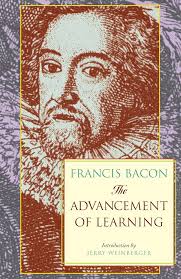The Advancement of Learning Page #23
The Advancement of Learning, published by Francis Bacon in 1605, is a foundational text in the history of science and philosophy. In this work, Bacon advocates for empirical research and the systematic organization of knowledge, laying the groundwork for the scientific method. The book critiques existing scholarly practices and proposes a new approach to learning based on observation and experimentation. It marks a significant shift towards modern scientific inquiry.
- Year:
- 1605
- 1,153 Views
Submitted by acronimous on August 11, 2024
Modified by acronimous on August 11, 2024
of generations, productions, and motions; whether they be singularities of place and region, or the strange events of time and chance, or the effects of yet unknown properties, or the instances of exception to general kinds. It is true I find a number of books of fabulous experiments and secrets, and frivolous impostures for pleasure and strangeness; but a substantial and severe collection of the heteroclites or irregulars of Nature, well examined and described, I find not, specially not with due rejection of fables and popular errors. For as things now are, if an untruth in Nature be once on foot, what by reason of the neglect of examination, and countenance of antiquity, and what by reason of the use of the opinion in similitudes and ornaments of speech, it is never called down. (4) The use of this work, honoured with a precedent in Aristotle, is nothing less than to give contentment to the appetite of curious and vain wits, as the manner of Mirabilaries is to do; but for two reasons, both of great weight: the one to correct the partiality of axioms and opinions, which are commonly framed only upon common and familiar examples; the other because from the wonders of Nature is the nearest intelligence and passage towards the wonders of art, for it is no more but by following and, as it were, hounding Nature in her wanderings, to be able to lead her afterwards to the same place again. Neither am I of opinion, in this history of marvels, that superstitious narrations of sorceries, witchcrafts, dreams, divinations, and the like, where there is an assurance and clear evidence of the fact, be altogether excluded. For it is not yet known in what cases and how far effects attributed to superstition do participate of natural causes; and, therefore, howsoever the practice of such things is to be condemned, yet from the speculation and consideration of them light may be taken, not only for the discerning of the offences, but for the further disclosing of Nature. Neither ought a man to make scruple of entering into these things for inquisition of truth, as your Majesty hath showed in your own example, who, with the two clear eyes of religion and natural philosophy, have looked deeply and wisely into these shadows, and yet proved yourself to be of the nature of the sun, which passeth through pollutions and itself remains as pure as before. But this I hold fit, that these narrations, which have mixture with superstition, be sorted by themselves, and not to be mingled with the narrations which are merely and sincerely natural. But as for the narrations touching the prodigies and miracles of religions, they are either not true or not natural; and, therefore, impertinent for the story of Nature. (5) For history of Nature, wrought or mechanical, I find some collections made of agriculture, and likewise of manual arts; but commonly with a rejection of experiments familiar and vulgar; for it is esteemed a kind of dishonour unto learning to descend to inquiry or meditation upon matters mechanical, except they be such as may be thought secrets, rarities, and special subtleties; which humour of vain and supercilious arrogancy is justly derided in Plato, where he brings in Hippias, a vaunting sophist, disputing with Socrates, a true and unfeigned inquisitor of truth; where, the subject being touching beauty, Socrates, after his wandering manner of inductions, put first an example of a fair virgin, and then of a fair horse, and then of a fair pot well glazed, whereat Hippias was offended, and said, “More than for courtesy’s sake, he did think much to dispute with any that did allege such base and sordid instances.” Whereunto Socrates answereth, “You have reason, and it becomes you well, being a man so trim in your vestments,” &c., and so goeth on in an irony. But the truth is, they be not the highest instances that give the securest information, as may be well expressed in the tale so common of the philosopher that, while he gazed upwards to the stars, fell into the water; for if he had looked down he might have seen the stars in the water, but looking aloft he could not see the water in the stars. So it cometh often to pass that mean and small things discover great, better than great can discover the small; and therefore Aristotle noteth well, “That the nature of everything is best seen in his smallest portions.” And for that cause he inquireth the nature of a commonwealth, first in a family, and the simple conjugations of man and wife, parent and child, master and servant, which are in every cottage. Even so likewise the nature of this great city of the world, and the policy thereof, must be first sought in mean concordances and small portions. So we see how that secret of Nature, of the turning of iron touched with the loadstone towards the north, was found out in needles of iron, not in bars of iron. (6) But if my judgment be of any weight, the use of history mechanical is of all others the most radical and fundamental towards natural philosophy; such natural philosophy as shall not vanish in the fume of subtle, sublime, or delectable speculation, but such as shall be operative to the endowment and benefit of man’s life. For it will not only minister and suggest for the present many ingenious practices in all trades, by a connection and transferring of the observations of one art to the use of another, when the experiences of several mysteries shall fall under the consideration of one man’s mind; but further, it will give a more true and real illumination concerning causes and axioms than is hitherto attained. For like as a man’s disposition is never well known till he be crossed, nor Proteus ever changed shapes till he was straitened and held fast; so the passages and variations of nature cannot appear so fully in the liberty of nature as in the trials and vexations of art. II. (1) For civil history, it is of three kinds; not unfitly to be compared with the three kinds of pictures or images. For of pictures or images we see some are unfinished, some are perfect, and some are defaced. So of histories we may find three kinds: memorials, perfect histories, and antiquities; for memorials are history unfinished, or the first or rough drafts of history; and antiquities are history defaced, or some remnants of history which have casually escaped the shipwreck of time. (2) Memorials, or preparatory history, are of two sorts; whereof the one may be termed commentaries, and the other registers. Commentaries are they which set down a continuance of the naked events and actions, without the motives or designs, the counsels, the speeches, the pretexts, the occasions, and other passages of action. For this is the true nature of a commentary (though Cæsar, in modesty mixed with greatness, did for his pleasure apply the name of a commentary to the best history of the
Translation
Translate and read this book in other languages:
Select another language:
- - Select -
- 简体中文 (Chinese - Simplified)
- 繁體中文 (Chinese - Traditional)
- Español (Spanish)
- Esperanto (Esperanto)
- 日本語 (Japanese)
- Português (Portuguese)
- Deutsch (German)
- العربية (Arabic)
- Français (French)
- Русский (Russian)
- ಕನ್ನಡ (Kannada)
- 한국어 (Korean)
- עברית (Hebrew)
- Gaeilge (Irish)
- Українська (Ukrainian)
- اردو (Urdu)
- Magyar (Hungarian)
- मानक हिन्दी (Hindi)
- Indonesia (Indonesian)
- Italiano (Italian)
- தமிழ் (Tamil)
- Türkçe (Turkish)
- తెలుగు (Telugu)
- ภาษาไทย (Thai)
- Tiếng Việt (Vietnamese)
- Čeština (Czech)
- Polski (Polish)
- Bahasa Indonesia (Indonesian)
- Românește (Romanian)
- Nederlands (Dutch)
- Ελληνικά (Greek)
- Latinum (Latin)
- Svenska (Swedish)
- Dansk (Danish)
- Suomi (Finnish)
- فارسی (Persian)
- ייִדיש (Yiddish)
- հայերեն (Armenian)
- Norsk (Norwegian)
- English (English)
Citation
Use the citation below to add this book to your bibliography:
Style:MLAChicagoAPA
"The Advancement of Learning Books." Literature.com. STANDS4 LLC, 2025. Web. 6 Mar. 2025. <https://www.literature.com/book/the_advancement_of_learning_3165>.








Discuss this The Advancement of Learning book with the community:
Report Comment
We're doing our best to make sure our content is useful, accurate and safe.
If by any chance you spot an inappropriate comment while navigating through our website please use this form to let us know, and we'll take care of it shortly.
Attachment
You need to be logged in to favorite.
Log In